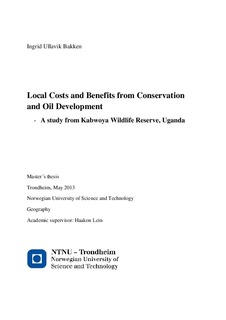| dc.description.abstract | In response to an increasing global awareness of environmental valuation, Kabwoya Wildlife Reserve in Uganda was established in 1996. Parallel to ongoing operations regarding significant oil discoveries in the region, the reserve is today operated through a conservation strategy of wildlife-based tourism. Although the region is expected to experience an increase in oil activities, this conservation strategy has been found to facilitate a win-win outcome for all involved stakeholders. Concerns have, however, been raised in response to local distribution of benefits from both conservation efforts and oil extraction. Through a political ecology approach, using on qualitative methodology, research was conducted in two of the reserve’s neighboring villages to shed more light on these concerns.
The purpose of the research was multi-faceted: the first aim was to find out how the establishment of the Kabwoya Wildlife Reserve has affected local access to resources. The second purpose was to investigate whether local communities have benefitted from wildlife-based tourism, either through active or passive engagement. A third aspect examined how oil activity has affected the area through chosen parameters, and lastly, the study aimed to investigate local attitudes towards a future coexistence of environmental conservation and oil development. Regarding the actual establishment of the reserve, findings imply that local interests had to yield to external interests and pressures, justified through "green" purposes. The results further indicate that a substantial portion of the benefits received from wildlife-based tourism is accumulated within the accounts of management agencies. As far as the influence of oil activities, it appears that the environmental impacts have so far been mitigated, but the challenges faced are expected to increase in the years to come. Regarding the possibility of future coexistence between the Kabwoya Reserve and natural resource interests, the findings have indicated varying perceptions, but have not provided any definitive answers. | nb_NO |
